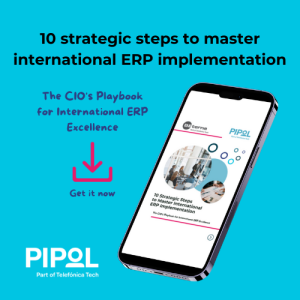Change management: 3 tips to break down resistance

Our many years of experience have taught us that when an ERP implementation fails, it is much more about the people involved than it is about the technology involved. Forrester Research has documented this fact many years ago. And throughout the years, many studies have shown the same result: Users’ resistance to adapt is the main cause of ERP project failures.
This problem has haunted the ERP world for years – and still does. Apparently, solving it is not that straight forward. If change is the problem, then how do you use change management to ensure a successful project?
Why do users resist ERP adoption?
In large international organizations, headquarters decide to roll-out a new ERP solution in their subsidiaries, and group management decide that new global processes need to be implemented together with the new system. In most cases, if they do not handle the human factor conscientiously, users may will resistance to adoption. This may potentially sabotage the entire project.
First, you must consider the potential reasons for resistance. Are they really caused by a general resistance to change? No. Resistance to change often occurs when the processes themselves are flawed or inappropriate for your organization. Do your global processes have the necessary quality? Is your organization properly informed and involved – and ready to follow you and back you up? Is resistance low in one country but high in another?
Human nature and cultural differences should not be underestimated when trying to make changes to business processes.
3 Practical change management tips before you start
When faced with resistance to change in an international ERP Implementation project, you may want to check a few things:
- Ensure the quality of global processes: Before you start harmonizing processes, make sure that the desired global processes are in fact of high quality and based on best practices/best fit that can benefit the entire organization. Often global processes are challenged at the local level, and it is not always due to general resistance to change. If acceptance of the new process is not because of a human-behavioral problem, then this suggests that either the process has quality problems, or it simply cannot be used due to differences in local conditions.
- Check your ambition level: The level of ambition for change must match the maturity level of your organization. If your company is mature, centrally driven, and makes efficient decisions from operational headquarters, then it makes sense to have everybody working on the same system. If, on the other hand, your organization has not already harmonized processes and has diverse operational processes in place, then a more evolutionary approach to harmonization may be the solution.
- Carefully choose your implementation method: To avoid delays, use a flexible implementation method, one that can enable international harmonization without delay. It could be a CORE solution approach where all entities have the option to run on individual copies of what is essentially the same harmonized platform. A CORE solution includes all the common company-wide processes and features, making local changes possible without jeopardizing processes in other entities or companies running on the same system.
Bottom line is, whether you lack a buy-in for change or users truly are resistant to change, you want to do everything you can to make sure that your entire organization focuses on the optimized future scenario, rather than today’s shortcomings. In reality, many challenges can be solved with good communication and dialogue with users before kickoff. In any case, basic rule number one for change management: Make a realistic plan for change. Then, you can begin to think about how to manage the change in your organization.
Read in more detail about the main challenges why ERP projects fail in our blog Culture is (still) the main reason why ERP projects fail.
Contact us if you would like to discuss your specific situation and considerations on how to implement an ERP solution across borders.
Pipol have 20+ years of experience within international ERP implementation. We are present in +85 countries through our alliance with local partners.





